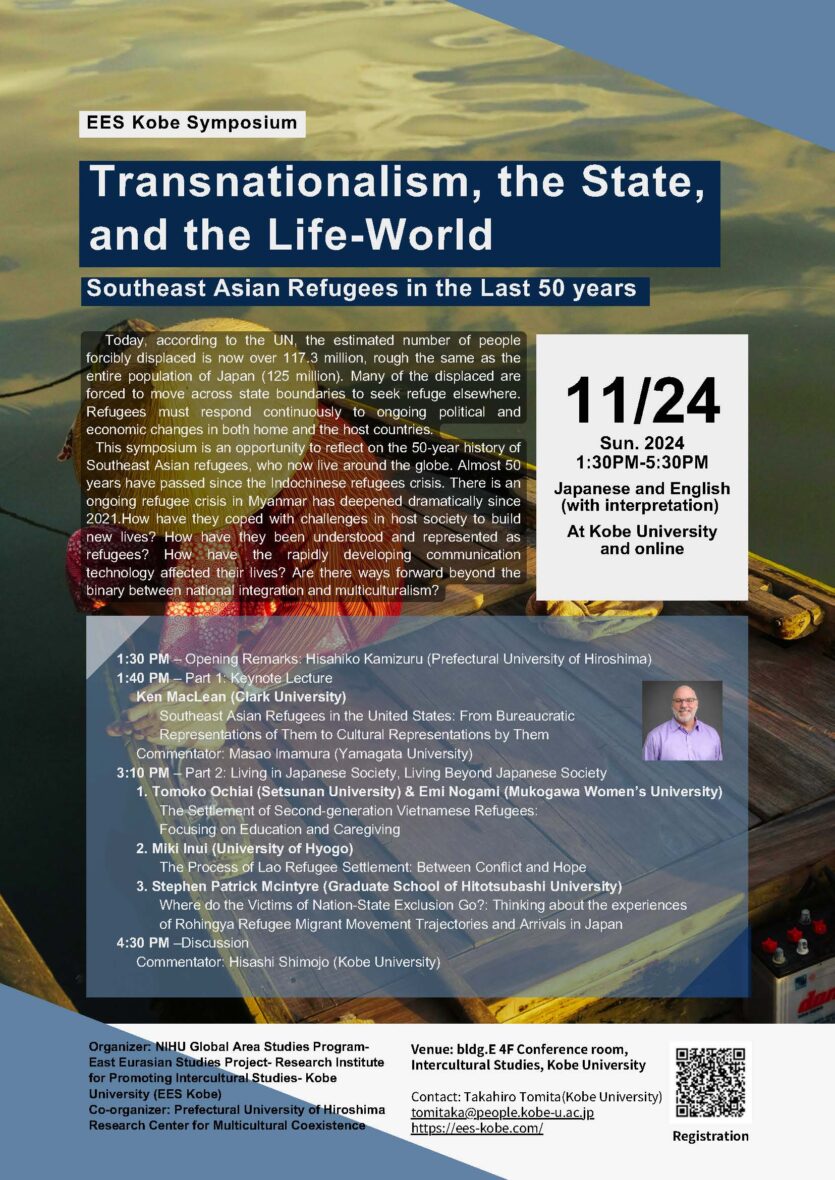Date
November 24, 2024 [Sun] 1:30 PM ~ 5:30 PM
Type of meeting
Hybrid meeting (In-person and Online)
Venue
At Building E, 4th Floor, Conference Room, Graduate School of Intercultural Studies, Kobe University
Language
Japanese and English (with interpretation)
Purpose
Today, according to the UN, the estimated number of people forcibly displaced is now over 117.3 million, rough the same as the entire population of Japan (125 million). Many of the displaced are forced to move across state boundaries to seek refuge elsewhere. Refugees must respond continuously to ongoing political and economic changes in both home and the host countries. This symposium is an opportunity to reflect on the 50-year history of Southeast Asian refugees, who now live around the globe. Almost 50 years have passed since the Indochinese refugees crisis. There is an ongoing refugee crisis in Myanmar has deepened dramatically since 2021.How have they coped with challenges in host society to build new lives? How have they been understood and represented as refugees? How have the rapidly developing communication technology affected their lives? Are there ways forward beyond the binary between national integration and multiculturalism?
Program
Opening Remarks
1:30 PM
Hisahiko Kamizuru (Prefectural University of Hiroshima)
Part 1: Keynote Lecture
1:40 PM
Ken MacLean(Clark University)
Southeast Asian Refugees in the United States: From Bureaucratic Representations of Them to Cultural Representations by Them
The talk examines how concepts and practices designed to assist Vietnamese, Cambodia, and Burmese refugees in the United States paradoxically makes them hyper-visible (as populations to be integrated) and invisible (as individuals with agency). Close attention to the latter offers a way to move beyond “the refugee” as an undifferentiated collective identity to one where the exercise of individual agency rejects the assumed need for paternalistic protection. Recognizing refugee agency thus means recentering refugee voices. Consequently, it requires us to understand how they themselves conceptualize their life experiences and how they seek to be recognized on their own terms, particular with regard to cultural expression—in this case, memorials and memoirs, rap music, and paintings.
Commentator: Masao Imamura (Yamagata University)
Part 2: Living in Japanese Society, Living Beyond Japanese Society
3:10 PM
1. Tomoko Ochiai (Setsunan University) & Emi Nogami (Mukogawa Women’s University)
The Settlement of Second-generation Vietnamese Refugees: Focusing on Education and Caregiving
2. Miki Inui (University of Hyogo)
The Process of Lao Refugee Settlement: Between Conflict and Hope
3. Stephen Patrick Mcintyre (Graduate School of Hitotsubashi University)
Where do the Victims of Nation-State Exclusion Go?: Thinking about the experiences of Rohingya Refugee Migrant Movement Trajectories and Arrivals in Japan
Discussion
4:30 PM
Commentator: Hisashi Shimojo (Kobe University)
Application for participation
Contact
Organizer: NIHU Global Area Studies Program-East Eurasian Studies Project- Research Institute for Promoting Intercultural Studies- Kobe University (EES Kobe)
Co-organizer: Research Center for Multicultural Coexistence, Prefectural University of Hiroshima
Contact: Takahiro Tomita(Kobe University) tomitaka@people.kobe-u.ac.jp
https://ees-kobe.com/


